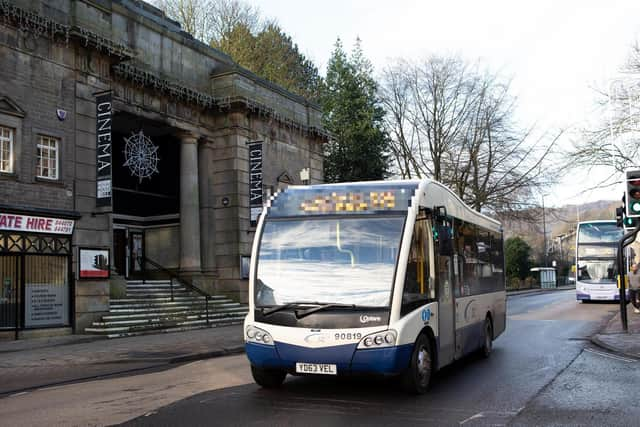Hundreds sign petition against axing of rural Calder Valley bus service
and live on Freeview channel 276
Tracy Brabin is being forwarded a petition signed by more than 600 people have signed a petition requesting this following the axing of services used by the people of Cragg Vale at certain times.
The petition argues changes to the 900 and 901 bus services linking Hebden Bridge and Huddersfield, operated under contract by TLC from West Yorkshire Combined Authority to serve Cragg Vale, were altered during the COVID-19 pandemic.
Advertisement
Hide AdAdvertisement
Hide AdCoun Scott Patient (Lab, Luddenden Foot) said the impact had been felt from children trying to get to school in Mytholmroyd, older students who attended Greenhead College at Huddersfield trying to get their connections and people trying to get to and from work, including some of the village’s business parks.


“It has been really challenging,” he said.
Residents including a representative of Cragg Vale Community Association told Calderdale Council’s Place Scrutiny Board, whose members were debating the petition, that recently 80 people had given evidence to West Yorkshire Metro about how they wanted to use the services but a key problem was reliability.
For example, those using the services to get to Halifax, or Hebden bridge Picture House and so on, had now found them “knocked off” after 9pm.
Mothers and children using buses to get to school in Mytholmroyd face a choice of either being late or having to wait 45 minutes in the cold because of timings.
Advertisement
Hide AdAdvertisement
Hide AdAnd to catch the bus when coming out of school, children would “have to be an Olympic sprinter,” said an association member.
Metro had claimed poor usage of the service, but the board heard there had been issues with passengers wanting to use contactless payment for their fares, this not being available and people being waved onto the bus as drivers did not want to see them stranded.
But this had the effect of registering lower numbers of passengers than were actually using the service, said Coun Patient.
Another residents said she used to use the services regularly to get to work in Manchester but because of changes had now had to change her shifts.
Advertisement
Hide AdAdvertisement
Hide AdThe council’s Head of Highways and Transportation, Steven Lee, said measures undertaken recently included bus transport being one of Ms Brabin’s pledges, the submission to the Department for Transport of an improvement plan to simplify ticketing and also the likelihood of the council being able to introduce “responsive” transport.
This, he said, “is effectively transport that is specifically designed for the more rural areas – a demand-led service as opposed to an operational service timetable, and that’s one of the things we are looking at.”
Mr Lee said an issue Cabinet would be looking at when it meets later this month is an enhanced partnership between district councils, West Yorkshire Combined Authority and bus operators, which is the first step on the route of re-franchising services.
“This basically means we would take back control of bus services and the bus operators run them to our expectations as opposed to running them to the commercial expectations they currently have,” he said.
Advertisement
Hide AdAdvertisement
Hide AdCoun Paul Bellenger (Lib Dem, Greetland and Stainland) said services for rural areas had to be reliable – he also described an account given by constituents of two buses going to the same place within ten minutes of each other and then nothing for another hour.
There were also issues of social exclusion, particularly of older people, involved, he said.
Coun Regan Dickenson (Con, Rastrick) said he was sympathetic having grown up in rural Devon with limited services, but it might need some digging into why they had been cut.
Ticketing issues had distorted the figures and if public transport was cheap and reliable people would use it, said Coun Helen Rivron (Lab, Ovenden).
Advertisement
Hide AdAdvertisement
Hide Ad* Support your Halifax Courier by becoming a digital subscriber. You will see 70 per cent fewer ads on stories, meaning faster load times and an overall enhanced user experience. Click here to subscribe